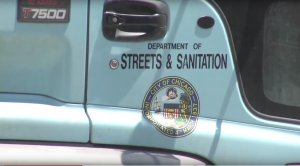Additional $10 million In grid garbage efficiencies announced
Chronicle Media — September 14, 2015
The additional reforms to grid garbage identify an additional $10 million in savings for refuse collection allowing the City to redirect the savings into other city services in 2016. (City of Chicago photo)
More than $10 million in additional grid garbage collection system efficiencies have been identified — approximately $7 million identified for 2016 in addition to the $3 million realized in 2014 — totaling $28 million in efficiencies and savings realized since the system was fully implemented in 2013.
“With the partnership of Laborers’ Local 1001, the grid system has enabled the city to continue providing quality garbage collection services while redirecting $28 million in operating costs to support the citywide recycling, and other key DSS Services,” said Mayor Rahm Emanuel. ”We remain committed to respecting Chicago’s hardworking taxpayers by delivering quality neighborhood services in the smartest and most efficient manner to hold down their costs.”
DSS will finalize the grid adjustment this fall, reducing the average daily deployment of refuse trucks from the current level of 310 trucks to 292 trucks. DSS will redirect the savings into other city services in 2016.
“The partnership between Laborers’ Local 1001 and the City ensures Chicagoans will continue to receive the best possible refuse collection service,” said James Ellis, Business Manager for the Laborers’ Local 1001. ”Our members take great pride in servicing the City of Chicago, and by improving city services, our members will provide more services to the citizens of Chicago.”
The initial implementation of the grid garbage collection system in 2013 allowed DSS to reduce the average daily refuse collection truck deployment from 352 to 317, resulting in balanced service regions, improved daily collection performance and the redirection of $18 million in resources to support the expansion of Blue Cart Recycling citywide.
“The efficient and effective management of city operations, including refuse collection, is important to the citizens of Chicago and the city employees that provide them. This is not the first time the City of Chicago has partnered with organized labor to improve operations. We will continue working with the City to show that government and organized labor are both interested in improving efficiency throughout all departments,” said Jorge Ramirez, President of the Chicago Federation of Labor.
In 2014, DSS began initial adjustments to the grid, which further reduced average daily truck deployment from 317 to 310. This reduction allowed for approximately $3 million in resources redirected to support DSS’ refuse and recycling cart inventory project that, once complete, will allow the department to better manage the city’s refuse art assets and more efficiently allocate refuse collection trucks and personnel.
“When we initially rolled out the grid system, we promised to monitor its progress and make any changes necessary to continue providing high-quality garbage collection for our residents,” said DSS Commissioner Charles L. Williams. ”We’ve been working with Laborers’ Local 1001 to evaluate many variables like the amount of time crews were spending on routes and daily tonnage reports, as well as implementing many of the recommendations provided by the Office of the Inspector General, which has resulted in these additional modifications that will further improve the efficiency and cost-effectiveness of the program.”
Since the implementation of the grid in 2013, DSS has continually evaluated the system by assessing time-in-alley reports, monitoring daily tonnage collection reports and conducting field audits. Additional factors contributing to the department’s ability to reduce the average daily refuse truck deployment include the successful citywide rollout of the Blue Cart Recycling Program, which diverts approximately 110,000 tons of waste to be recycled each year, and the recent amendment to the Municipal Code of Chicago section 7-28-240 repealing the costly “Grandfather Clause” for refuse collection at multi-unit residential buildings with more than four units.
Phased modifications to the grid system are scheduled to begin in the fall of 2015 and will be completed by summer 2016. Residents will continue to receive weekly garbage collection, though some residents may experience a change in their garbage collection day of service. Any residents impacted by a service day change will receive advance notification from DSS.
— Additional $10 million In grid garbage efficiencies announced —



